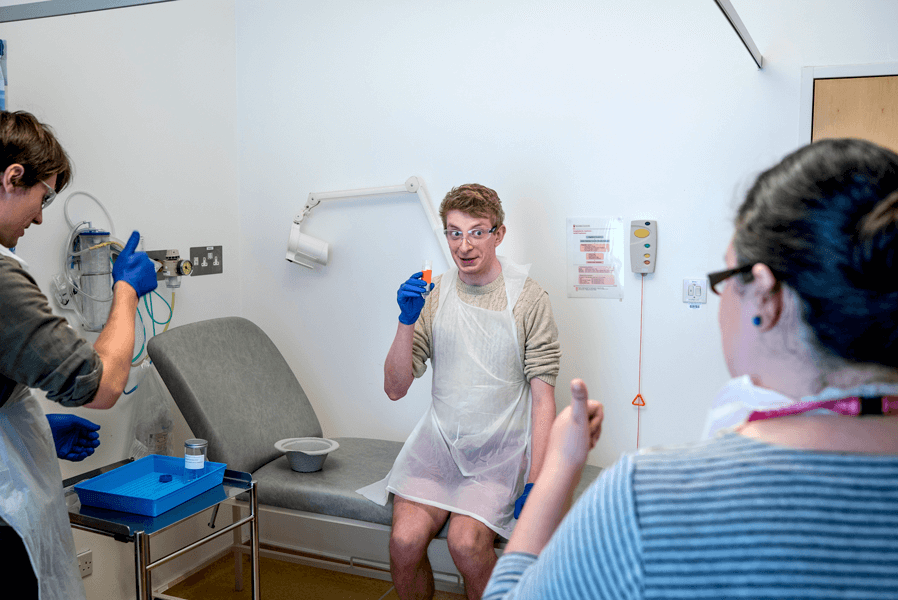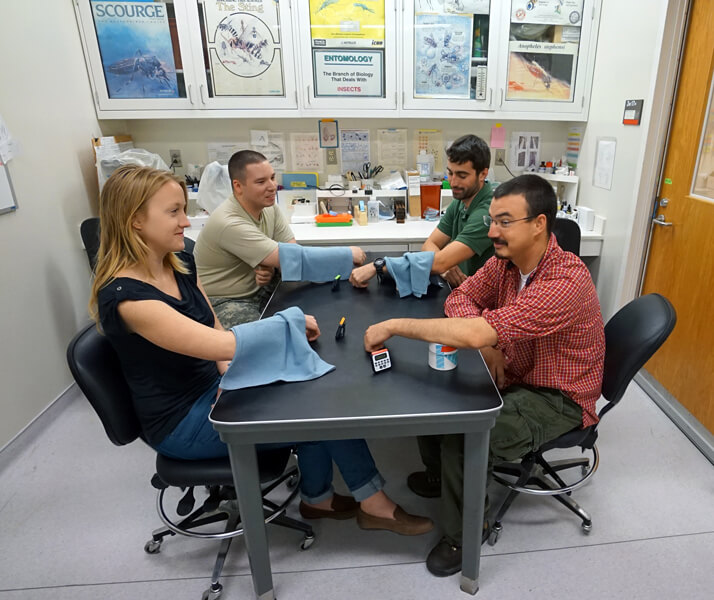An unusual statue stands in the courtyard of the San Fernando Medical School in Lima, Peru. It commemorates a student named Daniel Alcides Carrión, who died in 1885 after he deliberately exposed himself to bartonellosis, a bacterial disease spread by the bites of infected sand flies. Carrión was trying to prove that the disease was also responsible for distinctive lesions that erupted from the skin of people in the region. He did so — but only after dying when he injected himself with material taken from one such lesion on a patient.
Carrión’s risky self-experiment was very much of its time. But a new generation of scientists have revived and updated the principle, and are once again purposely exposing, if not themselves, then other human volunteers to harmful diseases. The good people of Southampton, UK, are being asked to inhale a bad bug that is driving a lethal, international revival of infant whooping cough. Fifteen strong-willed men and women in 2010 endured a week of stomach cramps and diarrhea at the University of Vermont after they knowingly swallowed a food-poisoning agent found in raw milk. And in the last few decades hundreds of men in the southern United States have come forward to be inoculated with gonorrhea, well, you know where.
Supporters of these types of experiments — called human challenge trials or controlled human infection models — argue that they are the quickest and cheapest way to develop new vaccines, test medicines and study the basic progression of some of humanity’s most enduring infectious foes, as well as some new ones. The strategy is popular with organizations such as the British biomedical charity the Wellcome Trust and the Bill & Melinda Gates Foundation, as they spend their billions trying to tackle neglected ailments of the developing world. Malaria, dengue fever, cholera, influenza, typhoid and tuberculosis — which among them kill some three million people each year — are all being investigated by scientists who make healthy people purposely sick.

The Vibrio cholerae bacterium (shown here in a colored scanning electron micrograph) is the cause of cholera, an infectious and sometimes fatal disease. Human challenge trials with the microbe led to the development of Vaxchora, the first FDA-approved cholera vaccine.
CREDIT: AMI IMAGES / SCIENCE SOURCE
“It’s not without risk, but we work to make it as safe as we possibly can,” says Robert Read, an infectious disease expert at the University of Southampton who is leading the whooping cough trial. The conventional way to develop vaccines is expensive and inefficient, he says. “It wastes the lives of thousands of animals that are not physiologically relevant — and then, when we do pre-clinical work in people, we find it doesn’t work.”
Still, ethicists say it’s time for a more detailed assessment of the rights and wrongs of human challenge trials. That’s because, although the vast majority have taken place in rich nations, scientists increasingly seek volunteers in places where the diseases being studied are endemic. The shift is important if treatments and vaccines are to work, proponents of these studies say, because people who live under constant threat of a disease often develop a different immunological response.
Known risks, uncertain benefits
Deliberate infections can help researchers develop new vaccines, as well as test the effectiveness of some that have been in use for decades and try to improve them. Take Read’s Southampton project. Like most countries (both developed and developing), the UK routinely vaccinates against whooping cough in childhood, but protection by the vaccine is patchy, and serious epidemics crop up every few years. The Southampton study aims to understand why that is, by analyzing physiological responses, especially of people who silently harbor and pass on the bug without getting ill themselves.

A volunteer prepares to drink from a vial containing the bacterium that causes typhoid fever, which kills roughly 200,000 people each year. The study, conducted in Oxford, England, recruited local volunteers to test the effectiveness of a new typhoid vaccine.
CREDIT: ANDREW TESTA / THE NEW YORK TIMES / REDUX
Read’s team has squirted a solution containing up to 100,000 of the Bordetella pertussis bacteria that cause whooping cough into the noses of 52 people. Thirty-two were colonized by the microbe, and all were confined and closely watched in hospital for two weeks, at which point the infection was ended with antibiotics. The scientists now want to launch a second study that would allow volunteers to live at home and spend time in the community, enabling the number of enrollees to be much larger. The researchers have been working with public health experts to make sure it would be safe, for example by showing that infected volunteers do not shed infectious bacteria from their noses.
Such work poses a unique ethical conundrum. The volunteers — and sometimes those around them — are required to take on a known risk without the promise of any direct benefit to themselves in return. That’s very different, say, from people who already have cancer or are infected with HIV signing up for an experimental medicine. It’s why human challenge trials tend to focus on conditions with acute (that is, immediate) symptoms that can be treated and cleared up with no lasting damage. Ethical review committees charged with assessing and approving these projects have given most the green light.
Most, but not all. In February 2017, bioethicists put the kibosh on a human challenge trial that a group of scientists had proposed for Zika — a virus that flared across Latin America in 2016 and is linked to severe birth defects. The trial was going to give volunteers a potential vaccine and then see how well it worked against injections of small doses of the virus.
The ethicists, led by Seema Shah, then at the University of Washington School of Medicine in Seattle, raised two sticking points. The first is what’s known as the bystander risk. Because Zika can be sexually transmitted, participants could pass it on to partners who did not know about the trial and had not given consent. The second is that in rare cases, Zika infections can lead to chronic paralysis and even death, and the panel judged that a risk too far.
Participants in human challenge trials may expose their communities to infection and the risks that come with it. In 2017, a bioethics committee voted against human challenge trials for the Zika virus after concluding that the potential risks to third parties were too high. The chart compares these risks with risks from human challenge trials for malaria and dengue fever, and from standard early safety studies done for drug or vaccine development.
Shah didn’t see enough justification when the virus was widely circulating: Why not inoculate and try to protect people in natural populations? Since then, though, natural cases of the disease have dramatically declined, so there could now be no realistic alternative. And recent discoveries about the virus have also tipped the ethical scales in favor of such a human challenge trial — for example, new research shows that infected men are contagious to sexual partners for just 30 days, which is less time than previously thought. “It would be more ethically acceptable to do it today,” says Shah, who is now at Lurie Children’s Hospital and Northwestern Medical School.
The Zika case highlights a conundrum in vaccine testing, says Michael Diamond, a virologist and immunologist at Washington University School of Medicine in St Louis, Missouri. “A waning epidemic is bad news for a vaccinologist,” he says, because to show that vaccines work, “after they have been vaccinated you need people to get infected.” The severe drop in Zika cases — while good news for everybody else — means it’s become much harder to do that, and much more expensive. A major benefit of human challenge trials is that, because they deliberately cause infection, vaccines can be verified using far fewer people — in the Zika case, perhaps just 200, says Diamond, who cowrote an update on Zika vaccine development in the 2019 Annual Review of Medicine.
After the 2016 explosion in Zika virus cases, the numbers subsided, just as vaccine testing began (red bars). Since the best way to test a vaccine’s effectiveness is in the middle of an epidemic, when people will be exposed to the pathogen, a drop in cases is a problem for vaccine development. Human challenge trials offer an alternative testing route.
More money, more challenges
Such a focused approach is of great interest to funders. In November 2018, the Wellcome Trust invited proposals for further human challenge trials to run against more diseases endemic in low- and middle-income countries. With grants of up to £5 million (about $6.3 million) available for each project, the trust asked for plans on how deliberate infection could accelerate vaccine development for conditions from dengue and shigellosis to cholera and tuberculosis.
Until now, much of the focus in such countries has been on malaria. Since 2012, at least seven trials have infected healthy people with the malaria parasite in Tanzania, Kenya and Gabon; a further four are underway in Kenya, Equatorial Guinea and Mali. These aim to test vaccines and antimalarial drugs, and to probe basic science around infection, such as studying how natural immunity develops. The push is backed by investment in lab facilities (volunteers must typically be quarantined and watched carefully) and advances in technology (a technique to extract, purify and inject consistent doses of the malaria parasite has replaced the need to rely on mosquito bites).
Now, as the Wellcome initiative and others gear up, the use of challenge trials for other diseases in these parts of the world is expected to accelerate, presenting procedural challenges. “We should be especially vigilant when working in low- and middle-income countries,” says Michael Selgelid, a bioethics expert at Monash University in Melbourne, Australia. A central principle of bioethics is to avoid working with vulnerable populations, or to be especially careful when doing so. And volunteers in developing countries, he says, are more likely to be vulnerable. Rules there to protect human rights and govern research may not be as strict. And participants may be less well-educated than in developed countries and so be less informed about what they are consenting to.
Maureen Njue, a researcher with the KEMRI-Wellcome Trust Research Programme in Kilifi, Kenya, has collected responses from participants in one of the ongoing Kenya trials for malaria, and has raised some concerns. In a paper published last year in the journal Wellcome Open Research, she and colleagues warn that current ethical guidance for more than minimal-risk studies is inadequate. One of the thorniest issues is how much to pay volunteers — or even whether to call it a payment. Njue’s team was careful not to do so, viewing the cash as compensation for lost time and work. But cash is also a strong motivator for people who participate in clinical studies.
The Kenyan volunteers received $480 for the three-week study. That’s about five times greater than the typical unskilled wage rate in the country, but still ten times less than what’s paid to people on similar challenge trials in the US and UK. Several Kenyan participants said that being offered more money would have made them suspicious that the risk was higher than study organizers were letting on.

In this re-creation of a challenge trial to investigate treatments for malaria, volunteers place their arms over cups containing infected mosquitoes. In this phase of the trial, conducted at the Walter Reed Army Institute of Research, each volunteer had to be bitten by five mosquitoes.
CREDIT: WALTER REED ARMY INSTITUTE OF RESEARCH
Shah says a useful way for scientists to assess informally the bioethics of a project is to ask if they would be happy for themselves or their loved ones to take part. Indeed, she says, some researchers of human challenge trials go further and do try it themselves — sometimes making themselves ill in the process. (In doing so, these scientists are following a long tradition of self-experimentation. Perhaps most famously in recent times, the Australian Nobel Prize winner Barry Marshall drank a solution of the bacterium Helicobacter pylori to show it causes stomach ulcers.)
But however well-meaning the participants and however well-motivated they may be (by the death of a loved one, for example), it’s vital that the proper checks are in place when people join research projects, especially human challenge trials. “We can’t let people consent to whatever they want,” Shah says. “Informed consent is not a perfect protection and there has to be additional scrutiny.”
Transparency and better communication are the simplest ways to ensure that trials are done properly and to make improvements where necessary, ethicists say. For example, although the Kenyan volunteers consented to have 412 ml of blood removed during the study, some told Njue they were still taken aback by how much that turned out to be. Visuals to better demonstrate the quantity that will be withdrawn are now included in the educational materials shown to participants as part of the process. One participant, a 32-year-old man with 12 years of education, told the survey how a clinician taking blood “brought a cup of water, a spoon and a syringe” to show how much blood would be drawn, “so we were able to verify that it was OK. So, I no longer have any doubts.”
There are other issues, too. Researchers in India point out in an article in press at the International Journal of Infectious Diseases that the very different hygiene practices and sanitation infrastructure in that country mean that study protocols used in other places must be adapted. A typhoid challenge study in the UK, for example, can safely send infected volunteers home between tests. But in India, with unreliable sanitation, they would need to be quarantined to ensure that the pathogen did not spread to the community.
Done properly, challenge trials are a powerful tool. The US, for example, has used them over the last four decades in its investigations of cholera. That research, performed with the help of almost 200 healthy volunteers who were given the disease-causing bacteria, produced a new single-dose oral vaccine, Vaxchora, which was approved by the FDA in 2016.
Maryland required hospitals taking part to fly the traditional yellow flag of quarantine. That’s an example of the openness that experts say is the best way to avoid misinformation and nasty outcomes in this growing and important field. As visitors to the San Fernando Medical School in Lima can see for themselves, there have been enough of those already.




